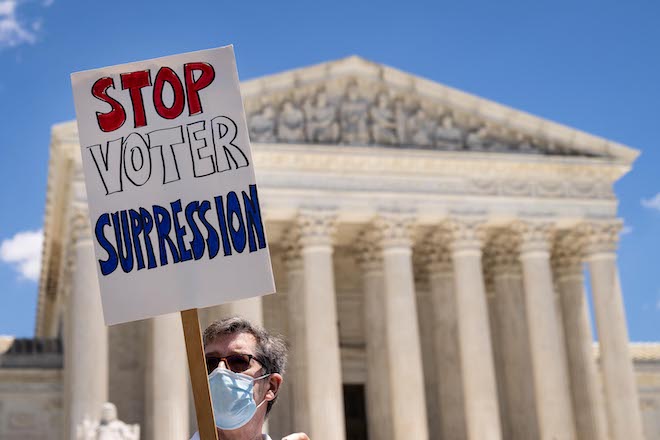Danger ahead
Bad news from SCOTUS ... Vaccines, climate and discrimination ... State secrets privilege applied in torture cases ... Partisan courts ... Forum shopping for flexible federal judges ... Political control of the state courts ... From Roger Fitch in Washington
 Bad decisions are flowing from the newly-stacked supreme court: notably, a decision overturning Occupational Health and Safety Administration regulations requiring employers to vaccinate employees. These unexceptional workplace regulations were blocked on grounds not found in the OSHA statute. American Prospect has more.
Bad decisions are flowing from the newly-stacked supreme court: notably, a decision overturning Occupational Health and Safety Administration regulations requiring employers to vaccinate employees. These unexceptional workplace regulations were blocked on grounds not found in the OSHA statute. American Prospect has more.
A case implicating climate change is now on the court's radar, threatening not only the EPA's authority to regulate, but the ability of Congress to delegate regulatory power to executive agencies. There's now a speculative Phantom Docket that reflexively questions administrative expertise.
While undermining benign health regulations, the court may be contemplating new legal loopholes, e.g, a "homophobia exemption" from anti-discrimination law.
Sadly, the court backed the government in appeals supporting the "state secrets" privilege: CIA torture (Zubaydah's) and FBI surveillance (Muslim).
An import from English law, the privilege was unknown in US law until 1953, when it was fabricated by the government and accepted by the supreme court. In US v Reynolds, the court found state secrets were an implied extension of executive privilege, another modern invention.
The Reynolds privilege afterwards proved to be falsely-claimed to conceal military negligence, yet the precedent remains, an absolute, unqualified rule of evidence.
In Zubaydah, the government pleaded "state secrets" to block testimony by the psychologists James Mitchell and Bruce Jessen, in the Poles' investigation of the CIA facility in their country. The men were employed by the CIA to devise the torture program used against Zubaydah.
The CIA's Polish torture camp is no secret, and was described in the Senate Torture Report.
Justices Sotomayor and Gorsuch vigorously dissented, with Gorsuch rightly characterising the state secret claim as seeking a judicial "rubber stamp" to avoid "further embarrassment for past misdeeds" of the government.
Poland has already been forced to pay Zubaydah damages for collusion in his CIA detention and torture, (so has Lithuania) and it's now following up with an investigation ordered by the European Court of Human Rights. The US signed the Hague Evidence Convention requiring cooperation.
President Obama also zealously pursued state secrets claims, even - to the surprise of many, including federal judges and the Times - those of George Bush. Curiously, the one legal proceeding where Obama did not plead state secrets was the one the ACLU brought against the very same psychologists whose evidence is sought by Zubaydah for the Polish inquiry.
Absent a state secrets defence, the ACLU case proceeded to trial and was settled by Mitchell and Jessen, who had CIA indemnities. It's the only litigation where the CIA was forced to pay damages (indirectly) to victims.
The Biden administration has continued some distasteful Trump initiatives, e.g, the Assange extradition, the federal death penalty in the Boston Marathon case, and the Hambali military commission - perhaps cynically, to protect government prerogatives.
 Assange: extradition still on foot
Assange: extradition still on foot
* * *
Some lower courts now seem overtly partisan. On the fifth circuit, 12 of the 17 judges are Republican appointees (six by Trump), and the fifth contains Texas, where the initial judicial harm is most often inflicted. There, as elsewhere, Trump's trial judges are white-anting voting protections, and otherwise joining the movement to rewrite American history of the last 90 years - one of social innovation and legal adaptation - to replace it with the contentious narrative of a theocratic, culturally conservative country.
18th century progress is also suspect. George Washington required troops to be vaccinated, and Thomas Jefferson spent years fighting smallpox anti-vaxxers; even so, after the supreme court overturned OSHA's mandate, a Texas district judge struck out the federal government's right to vaccinate its own employees.
There's now open forum-shopping for flexible federal judges, especially in the Northern District of Texas, where Fort Worth's Reed O'Connor has staked a claim as one of the most shamelessly partisan (more here) Republicans on the federal district court bench.
 Jefferson: fought the smallpox anti-vaxxers
Jefferson: fought the smallpox anti-vaxxers
* * *
By imposing new burdens on voting while blessing gerrymanders, the supreme court endangers democracy itself. Readers will recall that in the 2019 Rucho case, the court ruled that partisan gerrymanders could not be challenged under the federal constitution, although Chief Justice Roberts noted that such gerrymanders could still be challenged in state courts.
The Democrats proceeded to use state courts, with some success, but now the US supreme court seems poised to handicap the opposition (as the Republican majority perceives Democrats) even further. The answer? The misbegotten Independent State Legislature theory.
The issue first came up in the Pennsylvania Supreme Court. In 2020, Pennsylvania's Republican legislature threatened to reverse uncongenial case law and hobble the independence of the (elected) justices through legislation to create individual judicial districts.
The theory was that gerrymandered justices would clear the way for gerrymandered congressional and legislative districts.
When that didn't work, and a reluctant supreme court was forced to rule on contested gerrymanders, the legislature cooked up something else: an "independent state legislature" theory that cites the federal constitution to claim a legislature's supremacy over its highest courts and constitution. Carried to its logical conclusion, legislatures could even overturn popular elections.
This appalling ploy has a chance of success before today's partisan US supreme court. Law dean Vikram David Amar has written at length on the astonishing independent legislature construct, increasingly advanced by Republican legislatures in states with Democrat governors and/or supreme courts whose decisions - e.g, about the legislature's unlawful gerrymandered districts - are found wanting.
Republicans already control the greatest share of the decennial redistricting, but they want more.
In an appeal to the US supreme court by Republican legislatures of Pennsylvania and North Carolina, more here, it's claimed that state supreme courts don't have the power to review a legislature's partisan gerrymanders, even in reliance on the state's own constitution.
The supreme court provisionally rejected this, in shadow docket orders in appeals by the Republican legislators in both those states where Republicans lack party-dominated supreme courts. Election law specialists fear it's only a temporary reprieve.
 Supreme Court: gives its blessing to gerrymanders
Supreme Court: gives its blessing to gerrymanders
An appeal by Wisconsin's Republican-controlled state legislature is also on its way to the supreme court. In that state, the legislature enjoyed a one-justice majority on the supreme court but a Republican crossed the bench, so to speak, and supported the congressional districts adopted by the Democratic governor.
Outraged Republican members of congress from Wisconsin have now joined the fray.
Ohio's Republican legislators also believed they controlled the state's supreme court, but the Republican CJ joined the Democrats in rejecting proposed districts.
The districts challenged in Ohio and Michigan were drawn by independent Redistricting Commissions, but Ohio's supreme court has repeatedly found that state's commission-drawn districts to be biased.
Kansas Republicans are meanwhile proposing constitutional amendments to avoid supreme court independence: abolish the current merit appointments, and require the disfavoured partisan selection.
That should work.
No comments:
Post a Comment